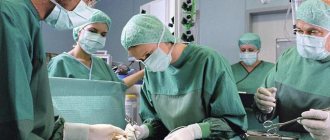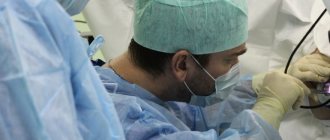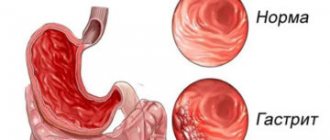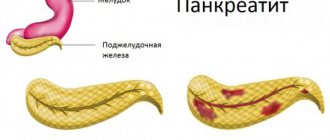Heaviness in the stomach that occurs immediately or some time after eating food is a problem that worries many. The reasons for the development of this condition may be different. This is, first of all, overeating, or eating harmful, difficult-to-digest foods.
However, if a feeling of heaviness and fullness in the abdomen occurs on a constant basis, even if there were no errors in nutrition, this is a cause for concern. After all, constant discomfort can be a consequence of serious diseases of the digestive tract.
Expert opinion
Sevastyanov Roman
General practitioner, hepatologist, gastroenterologist, highest qualification category. Site Expert
Therefore, when faced with a problem, it is necessary to determine its cause, and to do this you need to carefully listen to your body and determine under what circumstances discomfort occurs. Constant heaviness in the abdomen significantly worsens the quality of life and reduces a person’s performance, so this problem requires a timely solution.
Causes of heaviness in the stomach after eating
When a symptom such as heaviness in the stomach appears, the reasons for the development of this problem can be very diverse. The most common adverse factors are:
- Diet errors. For example, if a person consumes an excessive amount of fatty foods, fried foods, semi-finished products, which contain a large number of preservatives, flavor enhancers and other chemicals that negatively affect the functioning of the digestive organs;
- Wrong diet. It disrupts the normal functioning of the digestive system, when the gastrointestinal tract is forced to work under heavy overload. This is, for example, alternating long periods of fasting with excessive food intake, night meals;
- Insufficient chewing of food, haste when eating. Poorly chewed food enters the stomach in large pieces, making it more difficult for the organ to digest it, and the digestion process takes a lot of time. This leads to a feeling of heaviness in the stomach, as well as to the appearance of other unpleasant clinical manifestations;
- Consumption of expired, stale, low quality products. In this case, there is a high risk of developing food poisoning with all the manifestations characteristic of this situation, which negatively affect the functioning of the gastrointestinal tract and can be dangerous to health and life;
- Lack of physical activity. It is known that physical activity stimulates the functioning of the digestive system; lack of exercise has an adverse effect on the functioning of the stomach and intestines, and on the condition of the entire body as a whole;
- Lazy stomach syndrome (dyspeptic disorders). The development of this problem is caused by both poor nutrition and congenital anomalies of the gastrointestinal tract, as well as genetic disorders;
- Pregnancy. In the process of bearing a child, the female body undergoes a number of serious changes. These are, first of all, changes in hormonal levels, the development of toxicosis, compression of the peritoneal organs as the fetus grows;
- Adolescence, when various changes occur in the child’s body;
- Psychological problems, in particular, excessive emotionality, anxiety, tendency to stress and worry;
- Addiction to alcohol and cigarettes;
- Long-term use of certain types of medications, and, as a result of this, the development of dysbiosis and difficulty digesting food.
How to prevent
If you notice a tendency to develop heaviness in your stomach after a heavy meal, then you should not wait for problems to develop in your own body. In order to remove such sensations, you need to follow a few simple rules:
- Do not eat large amounts of food at one meal.
- Avoid drinking alcoholic beverages, especially those with a high percentage of ethyl alcohol.
- Limit your intake of spicy, sour and sweet foods, especially if you have chronic gastritis.
- Stop smoking to allow your body, including your gastrointestinal tract, to fully recover.
- If possible, avoid stressful situations and intense experiences, as they tone the sympathetic nervous system, which is manifested by stomach spasms.
What diseases can lead to the development of the problem?
The most common cause of heaviness in the stomach after eating food is an unhealthy diet, bad habits and poor diet. However, if a problem bothers a person for a long period of time, it is possible that some pathologies in the body led to its development. The most likely causes of diseases include:
| Disease | Characteristic |
| Gastritis | The pathology is inflammatory in nature and manifests itself as a result of the systematic negative impact of unfavorable factors (mechanical, chemical, thermal, bacterial damage) on the gastric mucosa. As a result of such exposure, the epithelium is injured, clear lesions appear on it, and the functionality of the organ is lost. |
| Peptic ulcer | The disease is accompanied by deep damage to the gastric mucosa, resulting in pronounced painful ulcers appearing on its walls. Most often, the disease develops against the background of untreated gastritis. The patient experiences very unpleasant sensations. This is a pain syndrome that occurs immediately after eating, or a few hours after a meal, or during fasting. There is a urge to vomit and stool disturbances. |
| Pyloric stenosis | The opening connecting the stomach and intestines is called the pylorus. Normally, the diameter of this opening is quite wide, which allows food to move freely from the stomach to the intestines. With the development of certain diseases, such as malignant or benign tumors, ulcers, the pylorus lumen becomes narrower. As a result, food moves more slowly and stagnates, which leads to a feeling of heaviness in the lower abdomen |
| Liver pathologies | If the cause of heaviness in the stomach is liver pathology, the patient faces the following problems: yellowness of the skin and sclera, a feeling of fullness in the lower abdomen, accompanied by discomfort, deterioration of the condition, the appearance of specific rashes on the skin, darkening of stool and urine. |
| Neoplasms in the stomach | The appearance of heaviness in the abdomen is caused by the formation of malignant or benign tumors in the stomach cavity. The most dangerous situation is the development of carcinoma. When tumors appear, the patient is worried about such complaints as a feeling of rapid satiety, heaviness, pain, deterioration in general condition, loss of body weight, even to the point of exhaustion of the body. |
| Inflammation of the pancreas | This organ produces a large number of enzymes that make up the gastric juice. With the development of inflammation, the secretory function of the pancreas is lost, and accordingly, the composition of the gastric juice changes. Food is less easily digested and stagnates in the stomach, leading to a feeling of heaviness. |
| Parasitic infestations | Worms and other parasites that penetrate the human body, in particular the digestive tract, damage their tissues. As a result, digestive function is lost, food stagnates in the stomach or intestines for a long time. |
Expert opinion
Shoshorin Yuri
General practitioner, site expert
All the diseases mentioned above pose a serious danger to the patient's health. Heaviness in the stomach is a characteristic symptom of all these pathologies, which means that if the patient constantly feels fullness and pain, it is necessary to undergo an examination as soon as possible and identify the cause of the problem.
Remedies
Many pathologies of the digestive system seem familiar to patients at first glance, so such a manifestation as heaviness in the stomach is considered easily removable. In fact, medications that relieve unpleasant symptoms do not solve the problem, but are only a method of quick help in the fight against the disease. In most cases, long-term therapy under the supervision of several specialists is required to return the stomach to its previous working condition.
Methods for correcting the condition:
- Drug therapy;
- Lifestyle adjustments, including compliance with preventive measures;
- Ethnoscience.
Drug therapy
The following drugs can be used as the main medications for heaviness in the stomach:
- "Mezim."
- "Almagel".
- "Renny."
- "Gastal"
- Means to eliminate the symptoms of dysbiosis.
- Laxatives.
- "Phosphalugel".
- "Lactomarin".
- "Motilium".
- Activated carbon.
It is important to understand that taking these medications should not be done regularly, otherwise undesirable consequences such as sluggish bowel syndrome, pancreatic failure, and chronic stomach pathologies may develop. In addition, all medications must be selected in conjunction with a doctor.
Prevention and general recommendations
In most cases, heaviness after eating can be eliminated without antibiotics or other drugs, but only with the help of general rules of nutrition and lifestyle, such as:
- Take at least a glass of clean drinking water on an empty stomach to prepare the stomach for its usual work. You should not drink any liquid during meals, so as not to further burden the organ.
- Avoid horizontal positioning for about an hour after your usual meal. You should move more throughout the day to stimulate your digestive system.
- Try to give up alcohol and smoking, especially on an empty stomach.
- Don't eat before bed. Meals should be organized at the same time.
- Portions of dishes should not be large, and meals should be split.
- You should chew your food thoroughly and do not swallow it in large pieces.
- Don't watch TV while eating.
- You should select food products wisely and combine them so as not to cause gas formation.
- You should not adhere to various diets without the advice of a doctor.
- It is necessary to get rid of excess weight.
Traditional methods
To eliminate short-term discomfort caused by heaviness in the stomach, you can use the following home recipes:
- Tea with mint, chamomile, lemon balm.
- Lemon, which can be added either to tea or consumed in its pure form.
- St. John's wort tincture.
- Nettle decoction.
- Take buckwheat on an empty stomach, crushed to a powder.
- Decoctions of yarrow, tansy, calendula.
It is important to understand that the fight against any illness that causes a feeling of heaviness should begin with determining the root causes of its occurrence, and only then with taking various medications. Any therapy should be carried out under the supervision of a physician.
Possible complications
The appearance of a feeling of heaviness is a symptom that cannot be ignored. Stagnation of food in the stomach leads to damage to the walls of the organ and the development of pathologies such as erosion, gastritis, ulcers, and the appearance of neoplasms.
If the severity develops against the background of gastrointestinal diseases, the lack of therapy may lead to an exacerbation of these pathologies, their transition to a more advanced and complex form.
Diagnostic methods
In addition to interviewing the patient, the doctor uses the following diagnostic methods:
- FGDS is an examination of the digestive system using an endoscope. During the procedure, the doctor assesses the condition of the organs and their walls, identifies the presence of damage, determines their location and size;
- Gastrochromogastroscopy – allows you to evaluate the secretory function of the stomach. The procedure is performed using an endoscope and special contrast dyes;
- Microscopic examination of the affected tissue to determine the extent of damage and possible causes that led to the problem;
- pH-metry to determine the acid composition of gastric juice and the degree of activity of these acids;
- Endovideo examination using a special probe equipped with a video camera. This method allows you to assess the condition of all parts of the gastrointestinal tract, identify areas of damage, and assess the extent;
- Fiberile colonoscopy for examination of the intestines. Allows you to evaluate organ motility and identify affected areas;
- Laboratory tests (examination of stool for the presence of blood, worm eggs, parasitic infections, blood and urine tests for the presence of inflammation and bacterial infections);
- Ultrasound of the digestive system to determine possible pathologies that can lead to heaviness in the abdomen.
Symptoms
If heaviness in the lower abdomen is observed only after eating, then the clinical picture may have the following symptoms:
- belching after eating, sometimes with a taste of previously consumed food;
- flatulence;
- minor disturbance in the gastrointestinal tract.
In the presence of gastroenterological pathology, symptoms may have the following additional signs:
- nausea, sometimes with bouts of vomiting;
- bloating;
- heaviness in the left side of the abdomen;
- feeling of being full even after consuming a minimal amount of food;
- loss of appetite;
- unstable stool - sudden attacks of diarrhea may be followed by prolonged constipation;
- heartburn;
- heaviness in the abdomen is observed almost constantly;
- sudden weight loss;
- After eating food, a person may experience stomach pain, which varies in nature and duration.
The main sign that heaviness in the abdomen is a sign of gastroenterological pathology is pain in the stomach. The nature of the pain, location and duration will depend on the underlying factor.
If you have such a symptom, you should consult a doctor and not self-medicate. Timely treatment will help avoid serious complications.
Recommendations for treating heaviness in the abdomen
If there is a pronounced feeling of fullness and heaviness in the abdomen, it is necessary to undergo a course of treatment. In addition to taking medications prescribed by the doctor, the patient must follow special recommendations, such as:
- Drink plenty of fluids. It’s good to drink 1 glass of warm water immediately after waking up. This will “wake up” the digestive system and prepare it for work. During the day, you should also not forget about water. It is recommended to consume at least 2 liters. clean water per day;
- Lifestyle correction. You need to give up bad habits as soon as possible and accustom yourself to physical activity. It is important not to lie down immediately after eating (at least in the first 30 minutes after the meal), but to engage in moderate physical exercise. This stimulates the functioning of the gastrointestinal tract, facilitates the process of digesting food;
- Excluding foods that are difficult to digest;
- Eating according to the established daily routine, at the same time;
- Have dinner 3-4 hours before bedtime;
- Eat food in small portions, chewing each piece thoroughly;
- Eating should take place in a calm atmosphere, without haste or distractions;
- Refusal of strict diets if there are no appropriate indications;
- Complete rest.
Prevention and prognosis
In order not to bring yourself to the hospital, hastily healing the consequences of an unhealthy lifestyle, it is best to devote time to the prevention of such conditions. In order to experience heaviness in your stomach as little as possible, you should reconsider your bad habits and acquire new, healthier and more useful ones.
Prevention of diseases of the gastrointestinal tract consists of:
- Compliance with the rules of rational and balanced nutrition. This means that a healthy person’s diet mainly consists of healthy and properly processed foods. Frequent consumption of fatty, fried, spicy foods is excluded, salt and sweets are limited. Drinking regime is important. It is best to distribute the daily menu into 4-5 meals.
- Stop drinking alcohol and smoking.
- Competent physical activity. Movement is life. A properly selected motor mode will ensure the health of all internal organs, not just the digestive organs.
- Avoiding frequent stressful situations. During nervous stress, all body systems suffer, and the consequences of such exposure take a long time to heal.
- Timely visits to doctors for preventive examinations. At an early stage, any disease is much more treatable.
The prognosis for this condition is favorable, because it is just a symptom. With a competent approach and prevention, this feeling will visit you as rarely as possible.
Medications
| Name | Description | Admission rules | Price |
| No-shpa | Prescribed for one-time manifestations of heaviness in the stomach. Helps eliminate spasms and pain, relaxes the muscles of the digestive organs, and facilitates the process of moving food. | 1-2 tablets 2-3 times a day. One-time dose (in some cases you can take 1-3 days). | 230 rub. |
| Motilium | Promotes the rapid movement of food through the esophagus, stimulates the process of contraction of the walls of the gastrointestinal tract, and eliminates nausea. | 10 MG 3-4 times a day. Duration -3-5 days. | 800 rub. |
| Ranitidine | They neutralize the effect of hydrochloric acid and reduce the process of its production. Prescribed if heaviness after eating is accompanied by heartburn. | 0.15-0.3 gr. 2 times a day. Duration -7-10 days. | 65 rub. |
| Rennie | They have a preventive, protective effect, enveloping the walls of the stomach and protecting them from negative effects. | 1-2 tablets several times a day (if necessary). The maximum daily dose is 10 tablets. The duration of treatment is determined individually. | 300 rub. |
Food
| Allowed | Forbidden |
|
|











